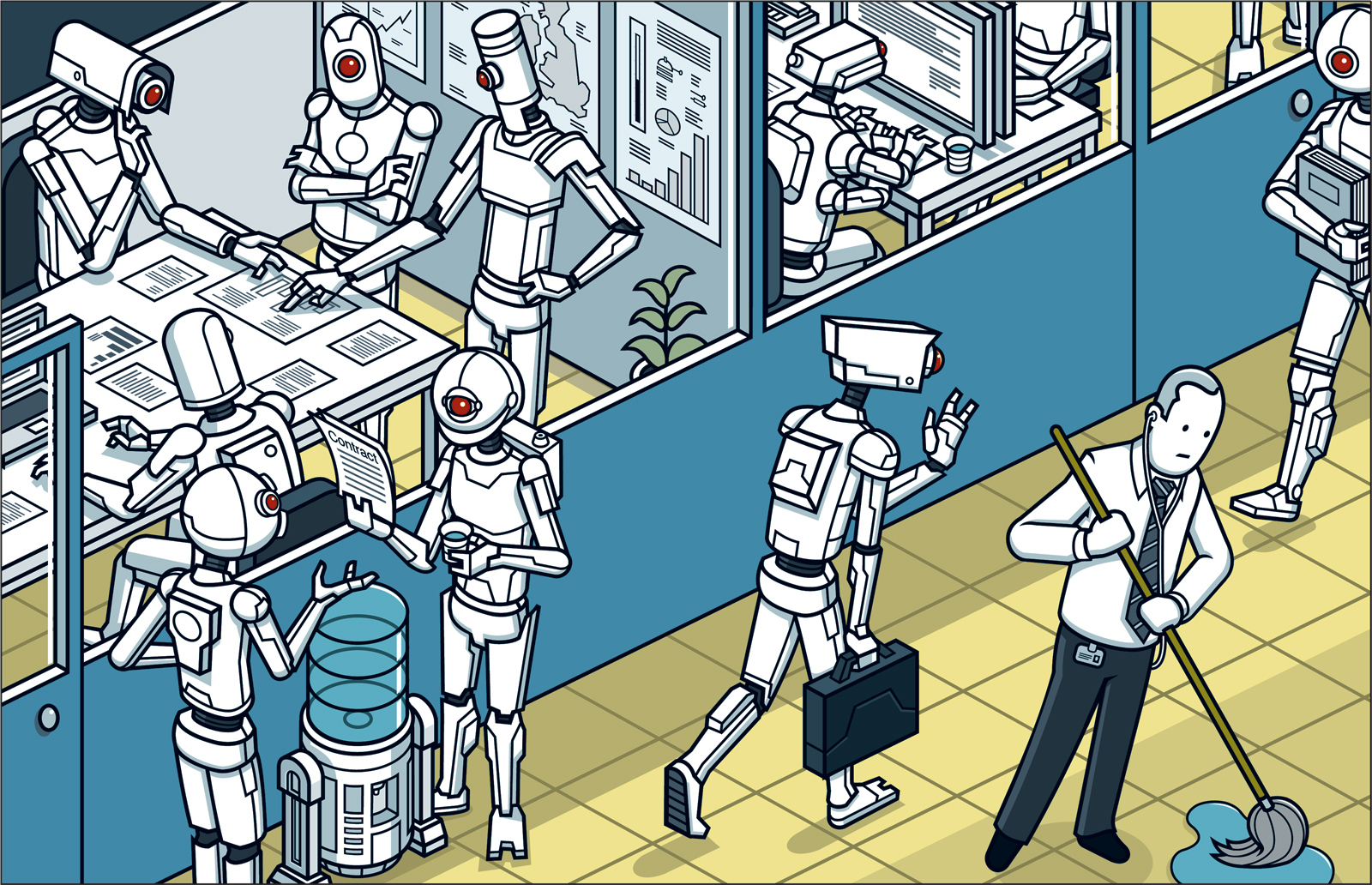Artificial Intelligence (AI) is rapidly transforming industries, and employment is no exception. As AI automates more tasks, shifts the demand for skills, and reshapes workplaces, it’s essential for tech professionals to stay informed. AI jobs are becoming more complex, requiring a mix of technical expertise, adaptability, and foresight. In this article, we will explore the impact of AI on employment, the benefits it offers, real-life examples, and case studies that illustrate these changes. Tech professionals must be prepared to harness AI’s potential, and this article will guide them through the key aspects they should know.
The Rise of AI Jobs

The rise of AI jobs has been exponential. According to a report from the World Economic Forum, AI is expected to displace 85 million jobs by 2025, but it will also create 97 million new roles. The key difference between the jobs AI eliminates and those it creates is the nature of the work. Jobs that involve repetitive tasks are at risk of automation, while positions that demand problem-solving, creativity, and emotional intelligence are growing in importance.
Key AI Jobs on the Rise:
- Machine Learning Engineers: Specialists who develop algorithms that allow machines to learn and adapt without explicit programming.
- Data Scientists: Professionals who analyze and interpret complex data to help businesses make informed decisions.
- AI Product Managers: Experts who oversee the development and implementation of AI-based products.
- Robotics Engineers: Professionals responsible for designing, building, and maintaining robots used across various industries.
How AI is Reshaping Employment
AI is not only creating new AI jobs, but it’s also reshaping traditional roles. For instance, in sectors like healthcare, AI systems assist doctors with diagnosing diseases through data analysis. In finance, AI-powered algorithms optimize trading strategies. This transformation requires tech professionals to acquire new skills and adapt to emerging technologies.
- Automation of Repetitive Tasks: AI excels at performing repetitive tasks with accuracy and speed. For example, chatbots are automating customer support roles, and Robotic Process Automation (RPA) is handling back-office functions such as data entry, allowing human employees to focus on higher-value tasks.
Example: AT&T, a telecommunications giant, uses AI to automate routine network maintenance tasks, freeing up its engineers to focus on complex problems, which leads to improved service delivery.
- Augmentation of Human Roles: AI is increasingly being used to enhance human capabilities rather than replace them. This augmentation is particularly evident in fields like healthcare, where AI helps doctors by analyzing scans and predicting disease progression, allowing for quicker and more accurate diagnoses.
Example: IBM’s Watson Health is an AI system used in hospitals to assist in cancer research, helping doctors develop personalized treatment plans.
- Creation of New Opportunities: AI is generating entirely new industries and job categories. For example, AI ethics officers are now being hired to ensure AI systems are fair, transparent, and do not discriminate against any group. Additionally, there is an increasing demand for AI trainers who help machines improve their understanding by feeding them data and correcting their mistakes.
Benefits of AI in Employment
AI brings multiple benefits to the workplace. Below are some key advantages:
- Increased Productivity: AI helps employees become more efficient by automating mundane tasks and allowing them to focus on strategic decision-making and creative problem-solving.
Case Study: Siemens, a global powerhouse in electrification and automation, uses AI in its factories to predict equipment malfunctions before they happen. By doing so, the company has minimized downtime and increased overall productivity by 20%.
- Enhanced Decision-Making: AI provides businesses with actionable insights by analyzing large amounts of data quickly and efficiently. This capability leads to better decision-making, especially in data-intensive industries like finance and marketing.
Example: JP Morgan uses AI to analyze financial contracts at a much faster rate than human employees. The AI system, known as COIN, reviews legal documents in seconds, reducing errors and increasing efficiency.
- Personalized Experiences: AI allows companies to offer personalized experiences to customers. Through AI-driven data analysis, businesses can understand their customers’ preferences and offer tailored products or services.
Example: Netflix’s recommendation engine uses AI to suggest movies and TV shows based on a user’s past viewing behavior, making the platform more engaging and personalized.
- Job Satisfaction: By automating repetitive tasks, AI allows employees to focus on creative, challenging, and more fulfilling work. It can reduce workplace stress and job burnout by taking on tedious assignments, such as data collection and processing.
Challenges and Considerations for Tech Professionals

While AI jobs and automation present numerous opportunities, they also come with challenges that tech professionals must be ready to face.
- Skill Gaps: As AI continues to evolve, the skills required to work with AI systems are changing rapidly. Professionals need to stay ahead of the curve by learning machine learning, data science, and AI development frameworks. For example, knowledge of programming languages such as Python and R is becoming essential for many AI roles.
Case Study: In India, the National Association of Software and Service Companies (NASSCOM) found that only 40% of its workforce was employable in AI roles, leading to a massive upskilling drive.
- Ethical Considerations: AI systems must be designed with ethical guidelines in mind. Tech professionals need to understand the potential for bias in AI algorithms and work to mitigate these risks. Ensuring that AI systems are transparent, unbiased, and fair is crucial for building trust among users and stakeholders.
Example: In 2018, Amazon faced backlash when its AI recruiting tool was found to be biased against women. The tool, which was trained on resumes submitted over a 10-year period, favored male candidates because the majority of resumes came from men. This incident highlights the importance of ethical AI design.
- Adaptability and Lifelong Learning: The fast-paced nature of AI technology requires tech professionals to commit to lifelong learning. Continuous education is necessary to stay updated with the latest AI developments and applications.
- Job Displacement and Workforce Transition: One of the significant concerns about AI is its potential to displace workers. However, it is vital to understand that while AI may eliminate some jobs, it also creates opportunities for workforce transition. Organizations and governments need to invest in reskilling and upskilling programs to help displaced workers transition into new roles in the AI-driven economy.
Case Study: Singapore’s government has implemented the SkillsFuture initiative, which provides its citizens with credits to take AI and tech-related courses. This forward-thinking approach is designed to help the workforce transition smoothly as the country embraces AI.
How Tech Professionals Can Prepare
To thrive in an AI-driven job market, tech professionals must:
- Learn AI and Machine Learning: Knowledge of AI and machine learning is crucial. Courses in AI, Python programming, and deep learning are essential for anyone looking to enter AI jobs.
- Embrace Interdisciplinary Learning: AI intersects with many fields, including ethics, law, and psychology. Tech professionals should adopt an interdisciplinary approach to understand how AI can be applied in different contexts.
- Stay Updated with Industry Trends: Reading AI blogs, attending conferences, and participating in AI communities can help professionals stay on top of the latest trends and best practices.
- Foster Creativity and Problem-Solving Skills: While AI can handle repetitive tasks, human creativity and problem-solving are irreplaceable. Fostering these skills will ensure that tech professionals remain valuable in the AI job market.
- Collaborate with AI Systems: Instead of fearing AI, professionals should learn to collaborate with it. By working alongside AI systems, they can achieve more than they could on their own.
Conclusion
AI is revolutionizing employment across industries, creating new opportunities while reshaping existing roles. For tech professionals, this means understanding the growing demand for AI jobs, staying updated with emerging trends, and constantly upgrading their skills. By embracing the changes AI brings, they can not only secure their place in the future of work but also thrive in an increasingly AI-driven world.




